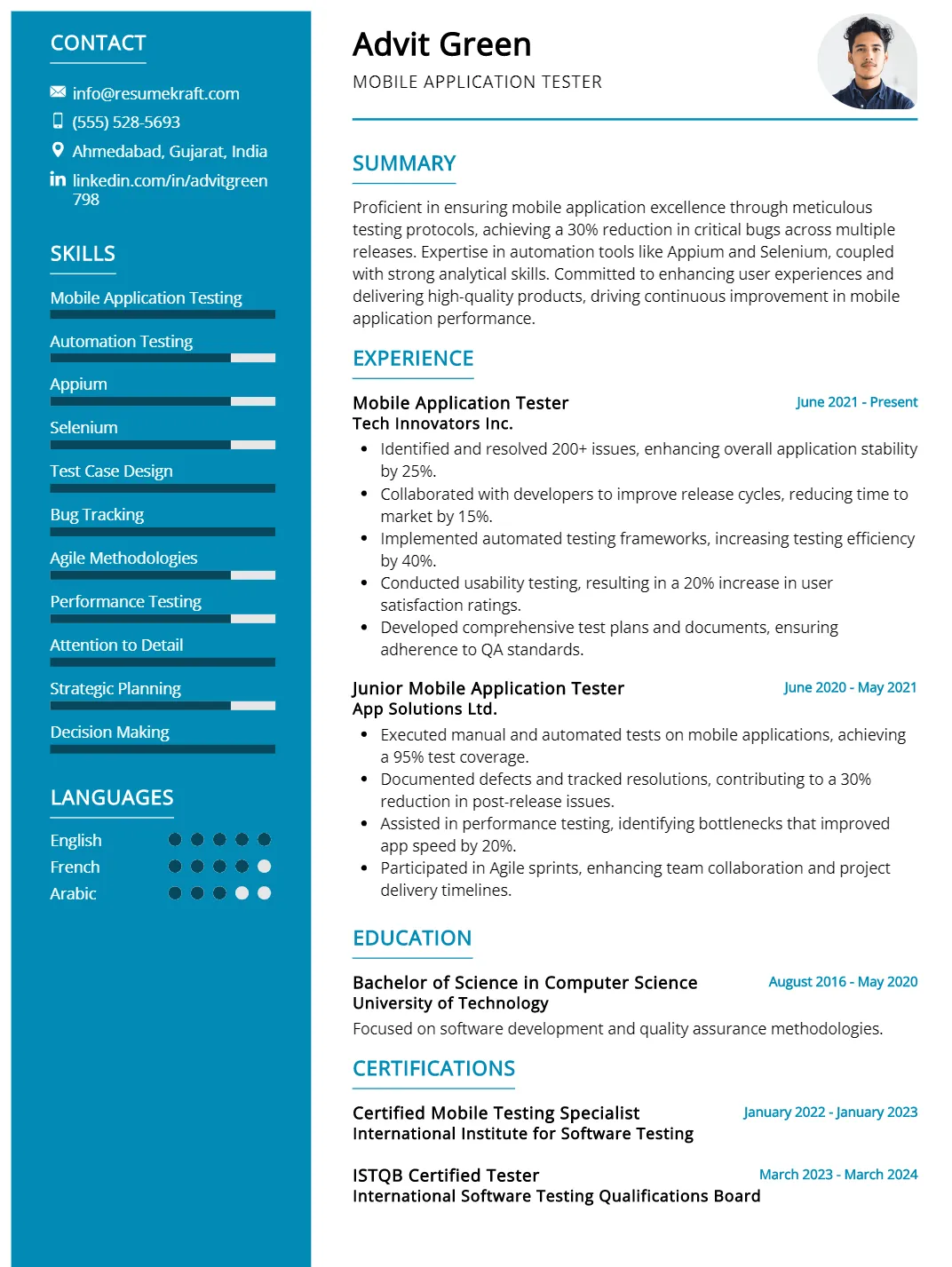
The role of a Software Tester is crucial in ensuring the quality and functionality of software applications before they reach end-users. Software Testers are responsible for identifying bugs, assessing usability, and validating that software meets specified requirements. In today’s fast-paced tech landscape, where user experience can make or break a product, the demand for skilled Software Testers continues to rise. This article aims to provide insights into crafting an effective resume for this vital role, highlighting key skills and best practices to help you stand out in a competitive job market.
- Software Tester resume examples
- How to format a Software Tester resume
- How to write your Software Tester resume experience
- How to list your hard skills and soft skills on your resume
- How to list your certifications and education on your resume
- How to write your Software Tester resume summary or objective
- Additional sections for a Software Tester resume
- Key takeaways for writing a professional Software Tester resume
- Frequently Asked Questions
Software Tester resume examples
Software Tester resume examples serve as valuable tools for job seekers looking to craft effective resumes tailored to this specific role. By examining these examples, candidates can gain insights into the essential skills, experiences, and formatting that resonate with hiring managers. Understanding what makes an impactful resume can significantly enhance a candidate’s chances of standing out in a competitive job market for software testing positions.
Software Tester Resume
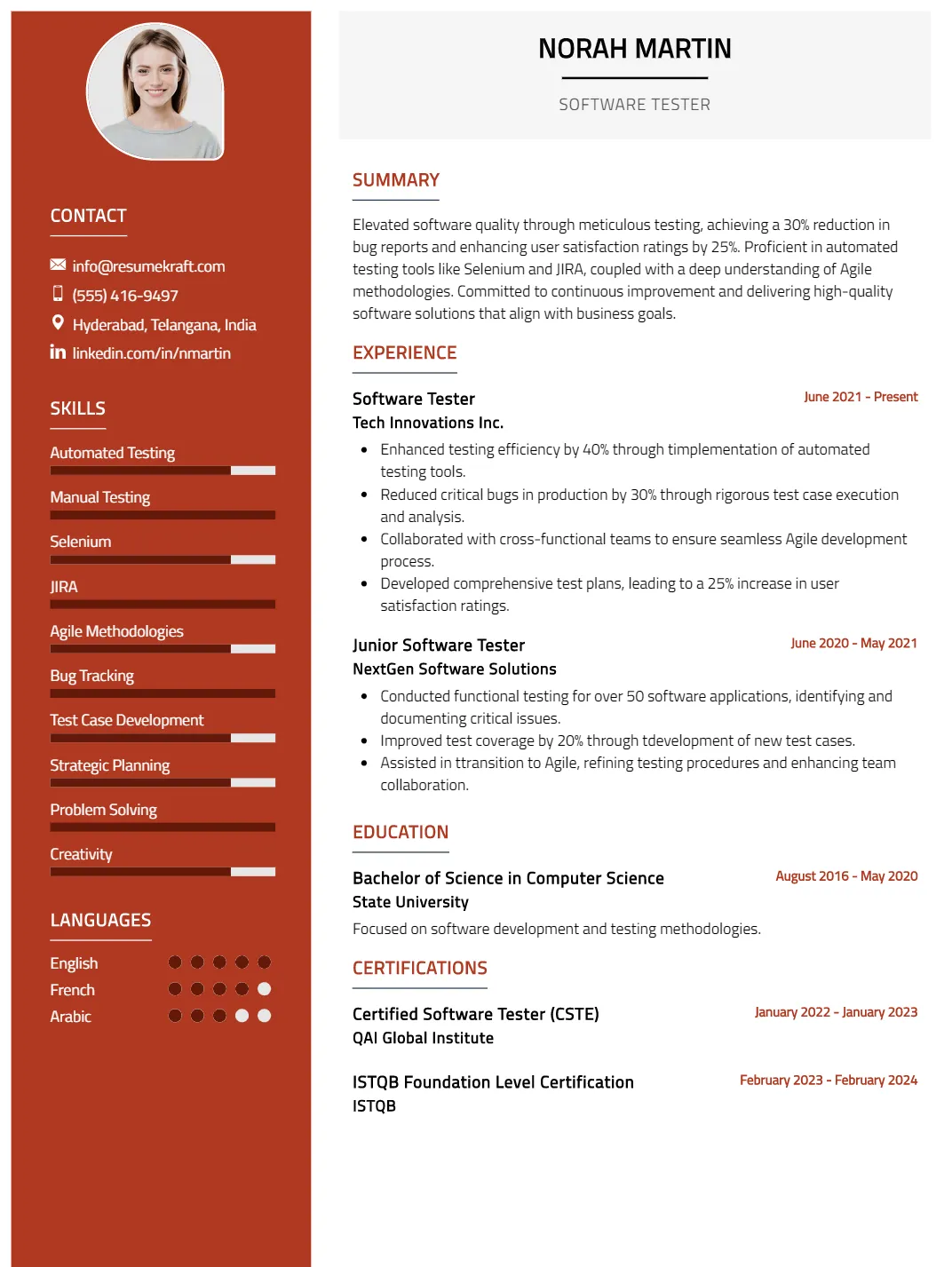
Why This Resume Works
This resume is effective for a Software Tester position due to its focus on relevant skills like Automated Testing, Selenium, and Agile methodologies, aligning perfectly with industry requirements. The structured format enhances readability, showcasing five years of progressive experience in testing roles that highlight both manual and automated expertise. It incorporates keywords optimized for ATS compatibility, ensuring visibility during the hiring process. Furthermore, the strategic presentation of achievements demonstrates measurable contributions to quality assurance, reinforcing the candidate’s value in enhancing software reliability.
Entry-Level Software Tester Resume
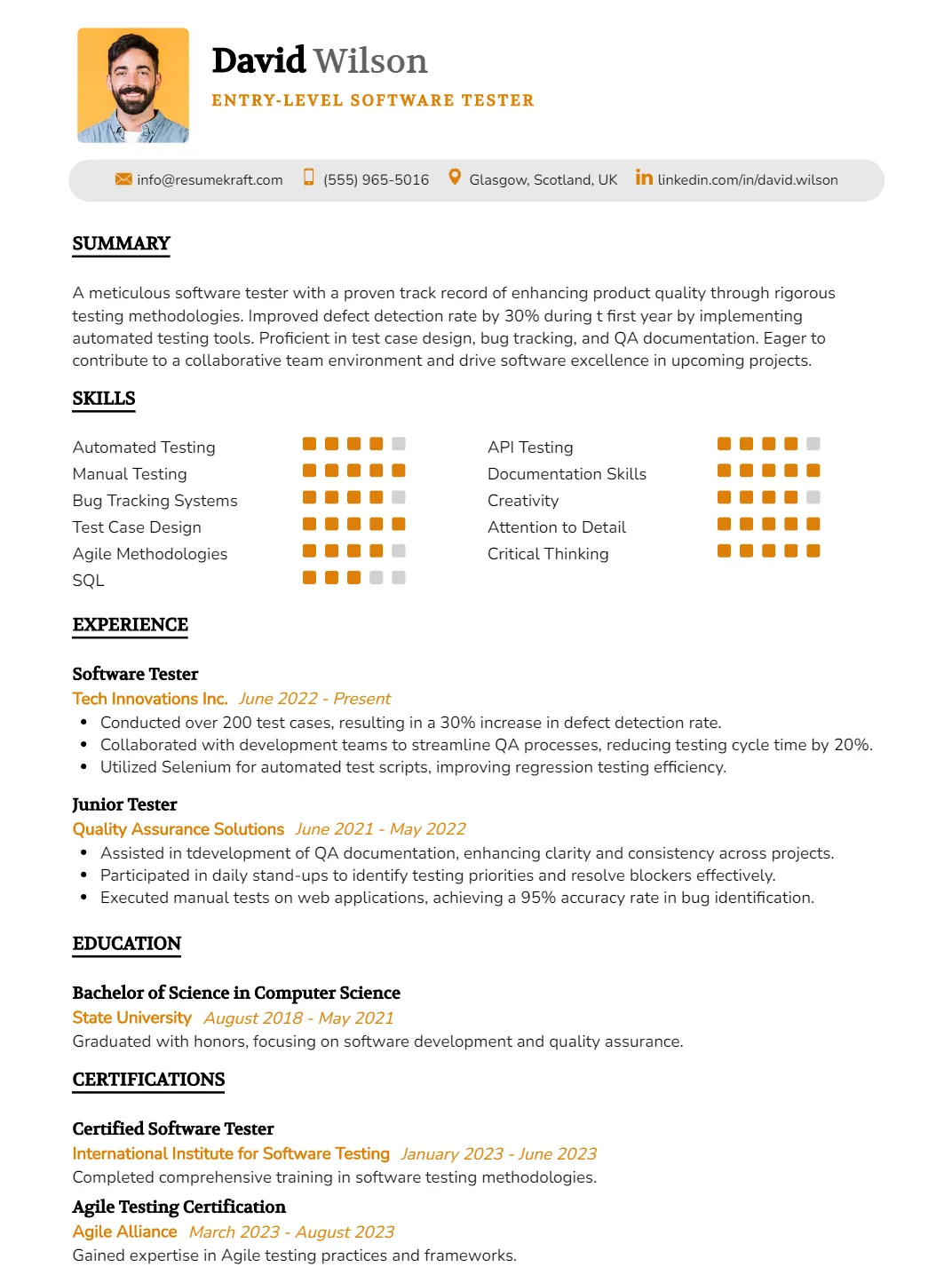
Why This Resume Works
This resume effectively highlights the candidate’s relevant skills and experience for an Entry-Level Software Tester position, showcasing expertise in both automated and manual testing, which are crucial for the role. Its clear format emphasizes key competencies like bug tracking and test case design, making it easy to read for hiring managers. Additionally, the use of industry-specific keywords enhances ATS compatibility. By strategically presenting achievements from previous roles, the resume demonstrates a solid foundation in Agile methodologies, aligning perfectly with industry expectations.
Junior Software Tester Resume
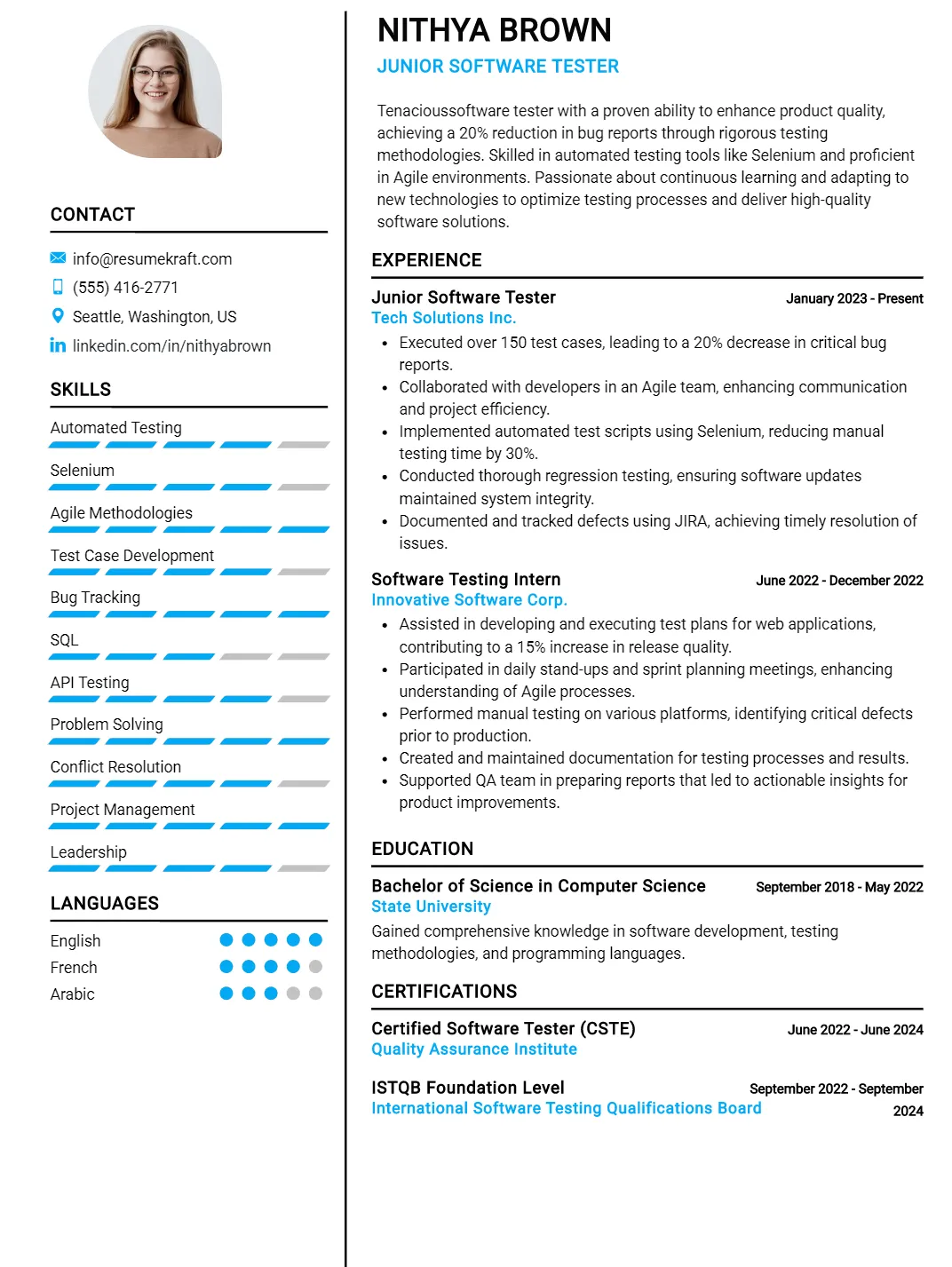
Why This Resume Works
This resume effectively highlights the candidate’s relevant skills, such as automated testing and proficiency with Selenium, which are crucial for a Junior Software Tester. With approximately two years of hands-on experience, including an internship, it demonstrates a solid foundation in test case development and bug tracking. The structured format enhances readability for hiring managers while ensuring ATS compatibility through the inclusion of industry-specific keywords. Additionally, strategic presentation of achievements showcases the candidate’s contributions to previous projects, making them stand out in this competitive field.
Senior QA Engineer Resume
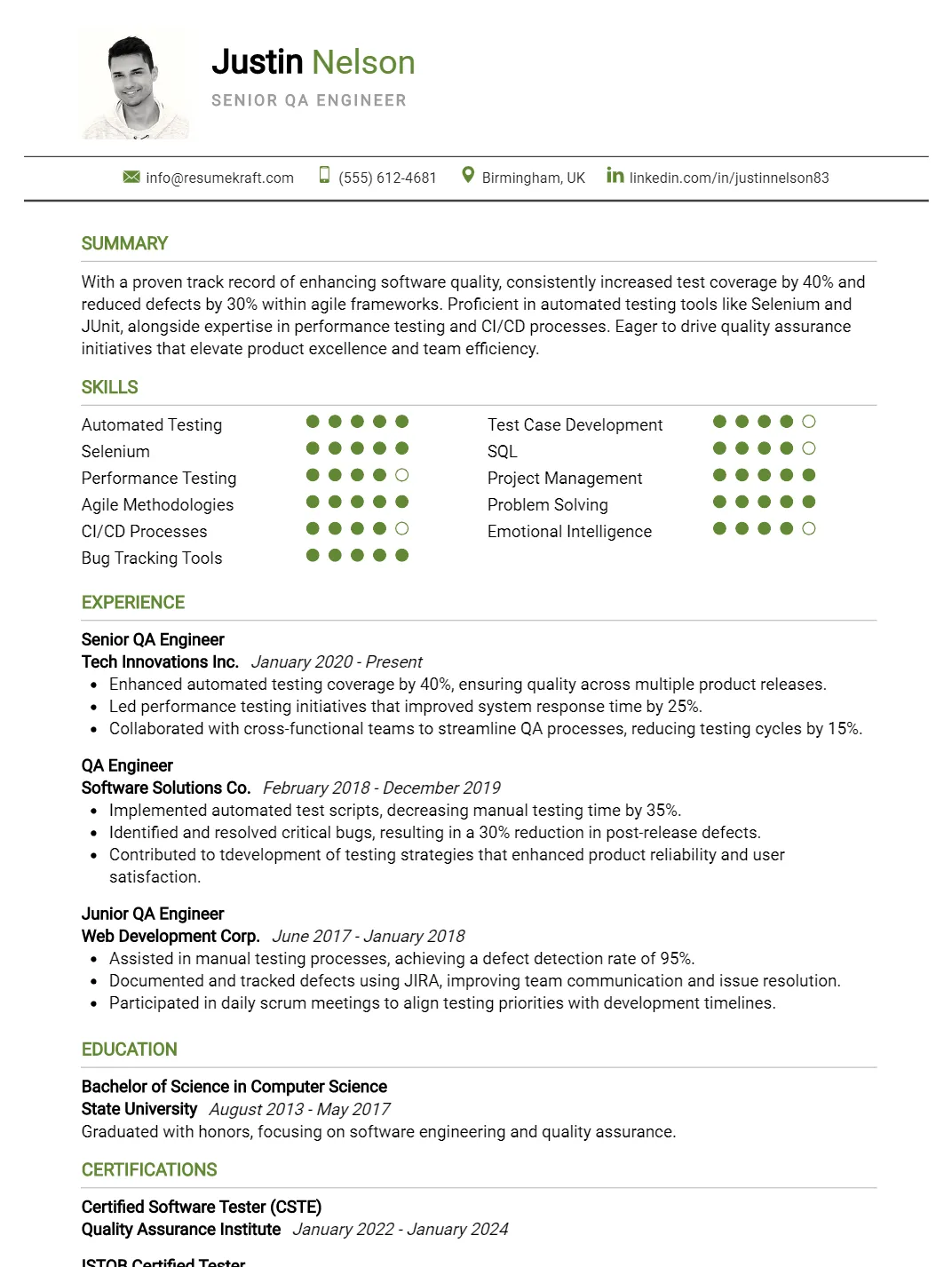
Why This Resume Works
This resume effectively highlights the candidate’s extensive experience as a Senior QA Engineer, showcasing key skills like Automated Testing and Selenium, crucial for this role. The clear structure allows hiring managers to quickly assess qualifications while ensuring ATS compatibility through relevant keywords. By emphasizing achievements in Performance Testing and CI/CD Processes within an Agile framework, the resume strategically aligns the candidate’s expertise with industry needs, enhancing appeal to potential employers looking for proven performance in quality assurance.
Software Tester with Automation Specialization Resume
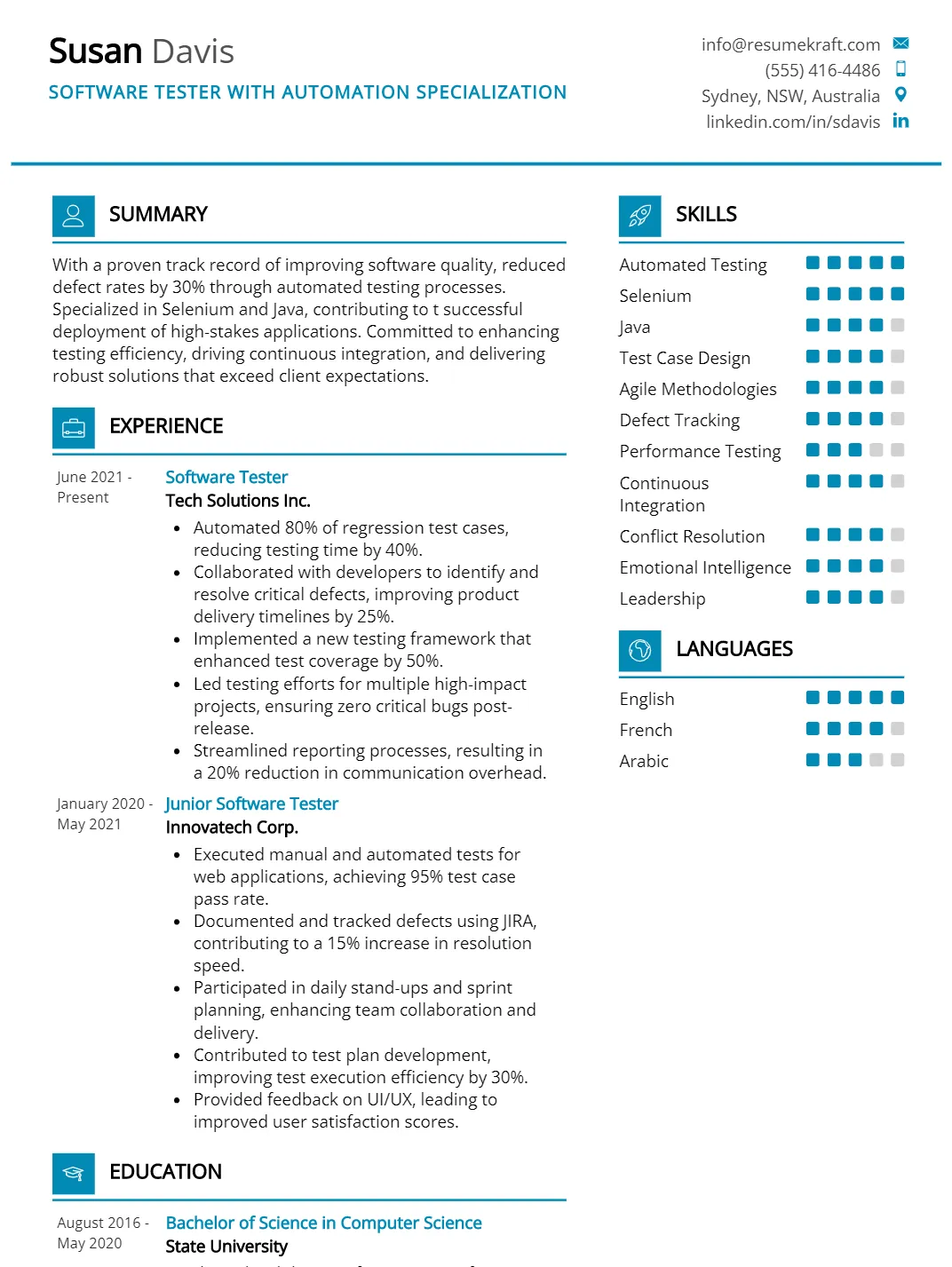
Why This Resume Works
This resume effectively highlights the candidate’s expertise in automated testing with proficiency in Selenium and Java, directly aligning with the requirements for a Software Tester with Automation Specialization. The structured format showcases relevant experience across two roles, emphasizing key skills like Test Case Design and Agile Methodologies. Its clear layout enhances ATS compatibility by incorporating industry-specific keywords. Additionally, the strategic presentation of achievements demonstrates a proven track record in improving testing efficiency, making it particularly compelling for hiring managers in this field.
QA Analyst Consultant Resume
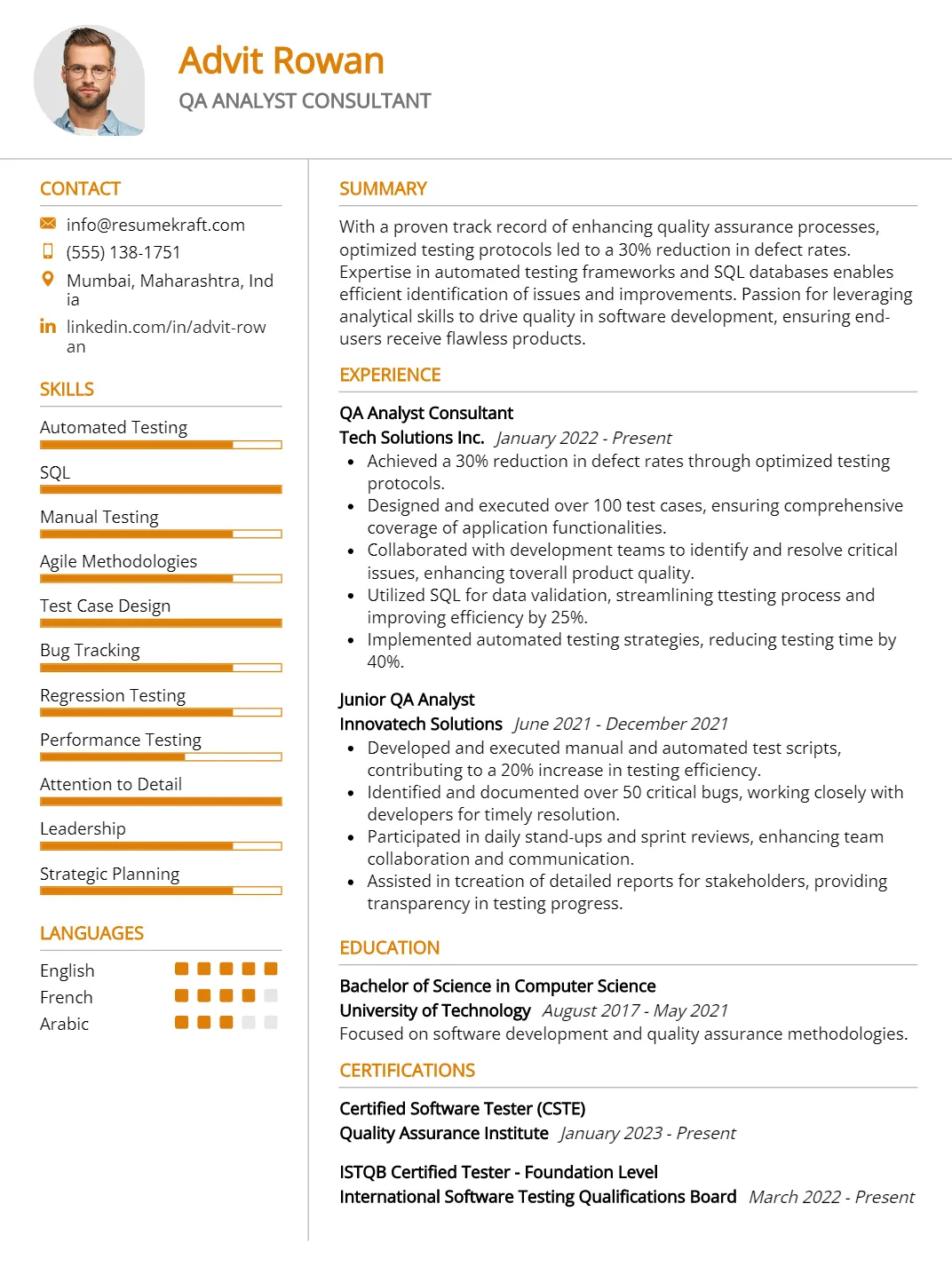
Why This Resume Works
This resume effectively highlights the candidate’s relevant skills, such as Automated Testing and SQL, which are crucial for a QA Analyst Consultant role. With approximately three years of experience in both QA Analyst Consultant and Junior QA Analyst positions, it demonstrates a solid career progression. The structured format enhances readability, making it easy for recruiters to identify key qualifications. Additionally, the use of industry-specific keywords ensures ATS compatibility, while strategic presentation of achievements showcases the candidate’s impact in past roles, aligning with industry expectations.
Lead Quality Assurance Specialist Resume
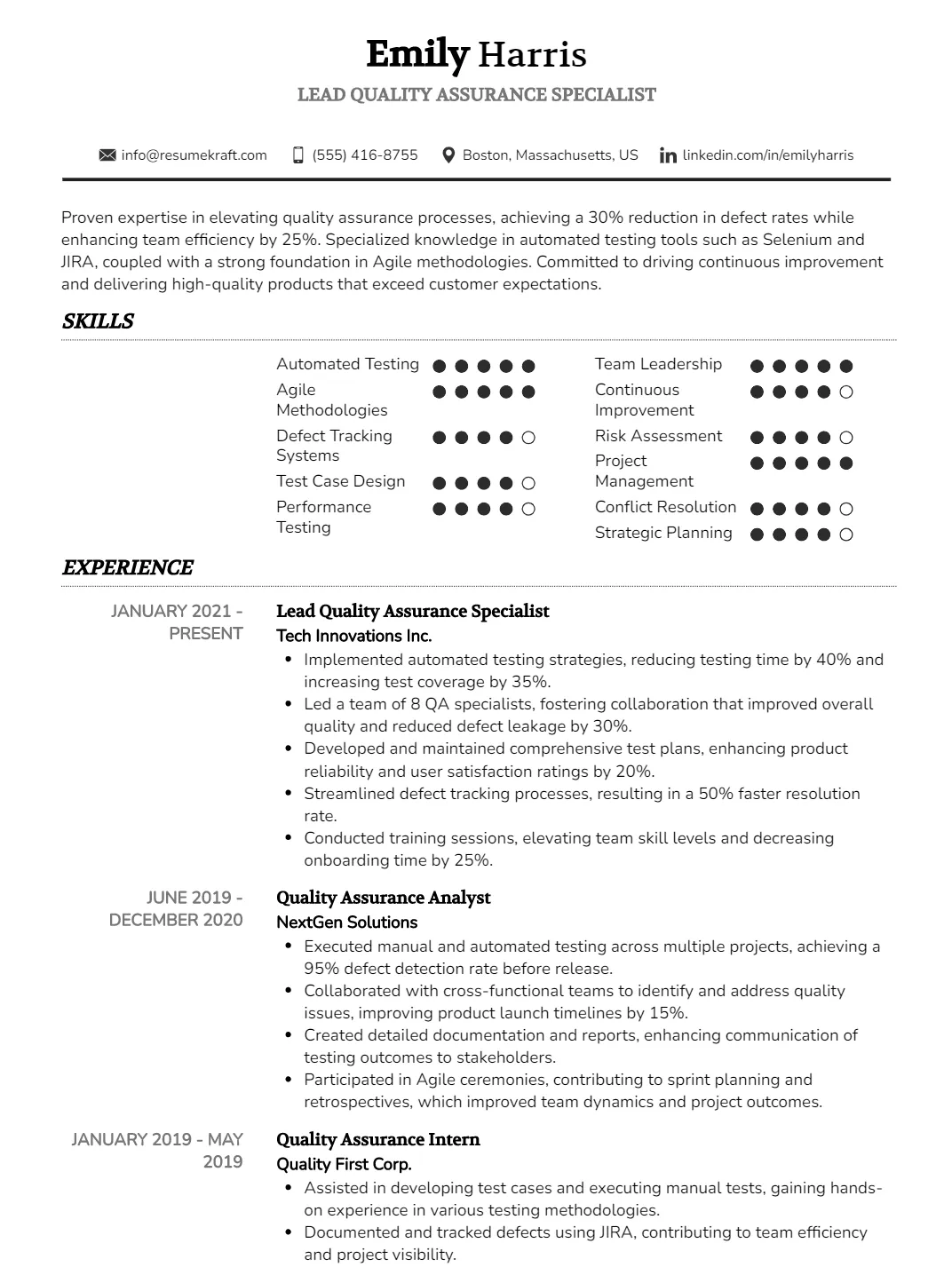
Why This Resume Works
This resume effectively positions the candidate for a Lead Quality Assurance Specialist role by highlighting key skills such as Automated Testing and Agile Methodologies, which are crucial in this field. With approximately five years of relevant experience, including leadership roles, it demonstrates a clear career progression. The structured format ensures easy readability and aligns with industry standards, enhancing ATS compatibility. Strategic presentation of achievements in defect tracking and performance testing underscores their impact on quality assurance processes, making the resume compelling for hiring managers.
System Validation Engineer Resume
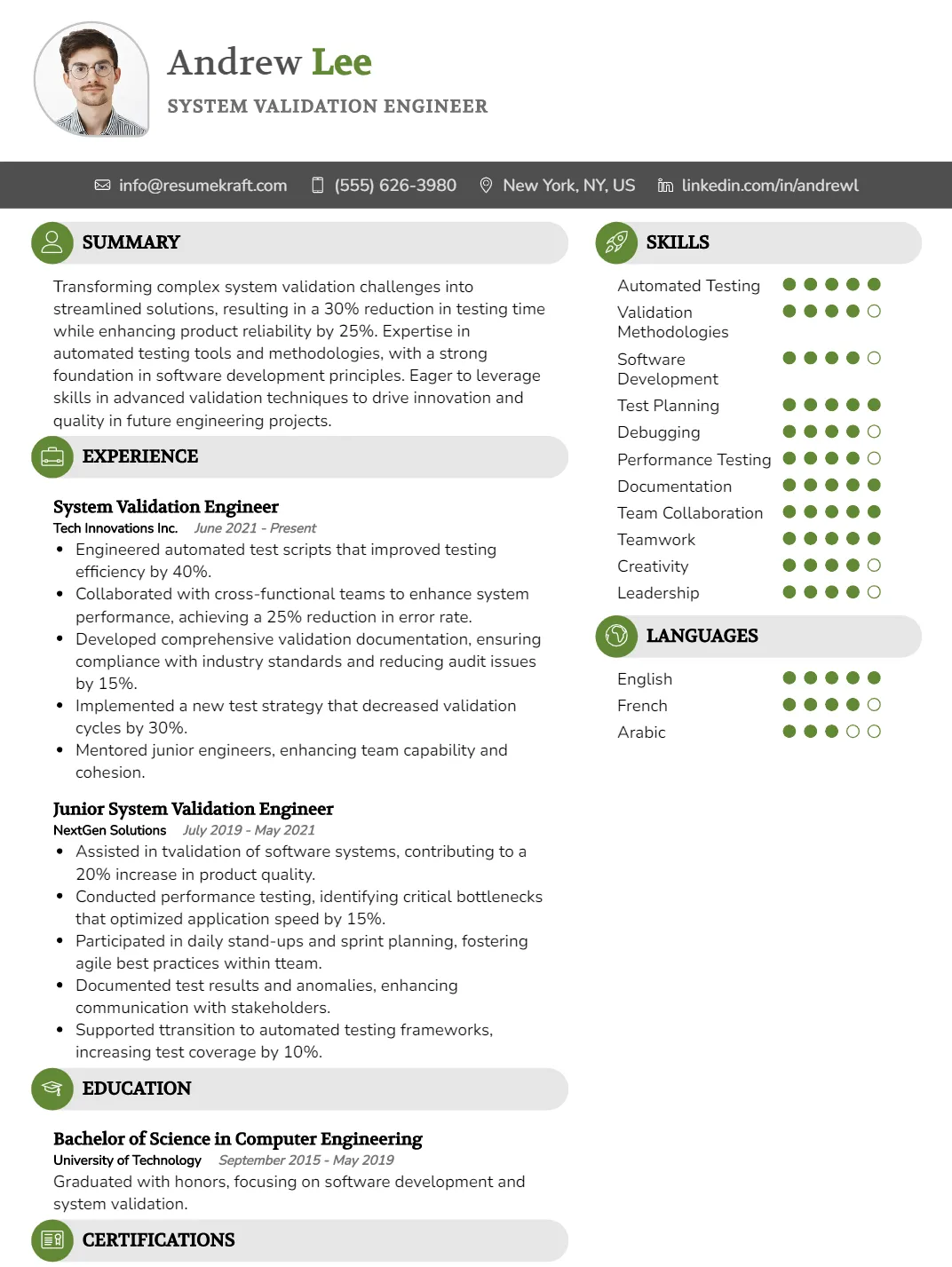
Why This Resume Works
This resume effectively highlights the candidate’s relevant skills and experience for a System Validation Engineer position, showcasing expertise in automated testing and validation methodologies. With approximately six years of progressive experience, it emphasizes a solid foundation in test planning and debugging, critical for this role. The clear format enhances readability, while strategic keywords ensure ATS compatibility, maximizing visibility to hiring managers. Additionally, the presentation of specific achievements demonstrates tangible contributions to previous employers, reinforcing the candidate’s capability to excel in system validation tasks.
QA Automation Engineer Resume
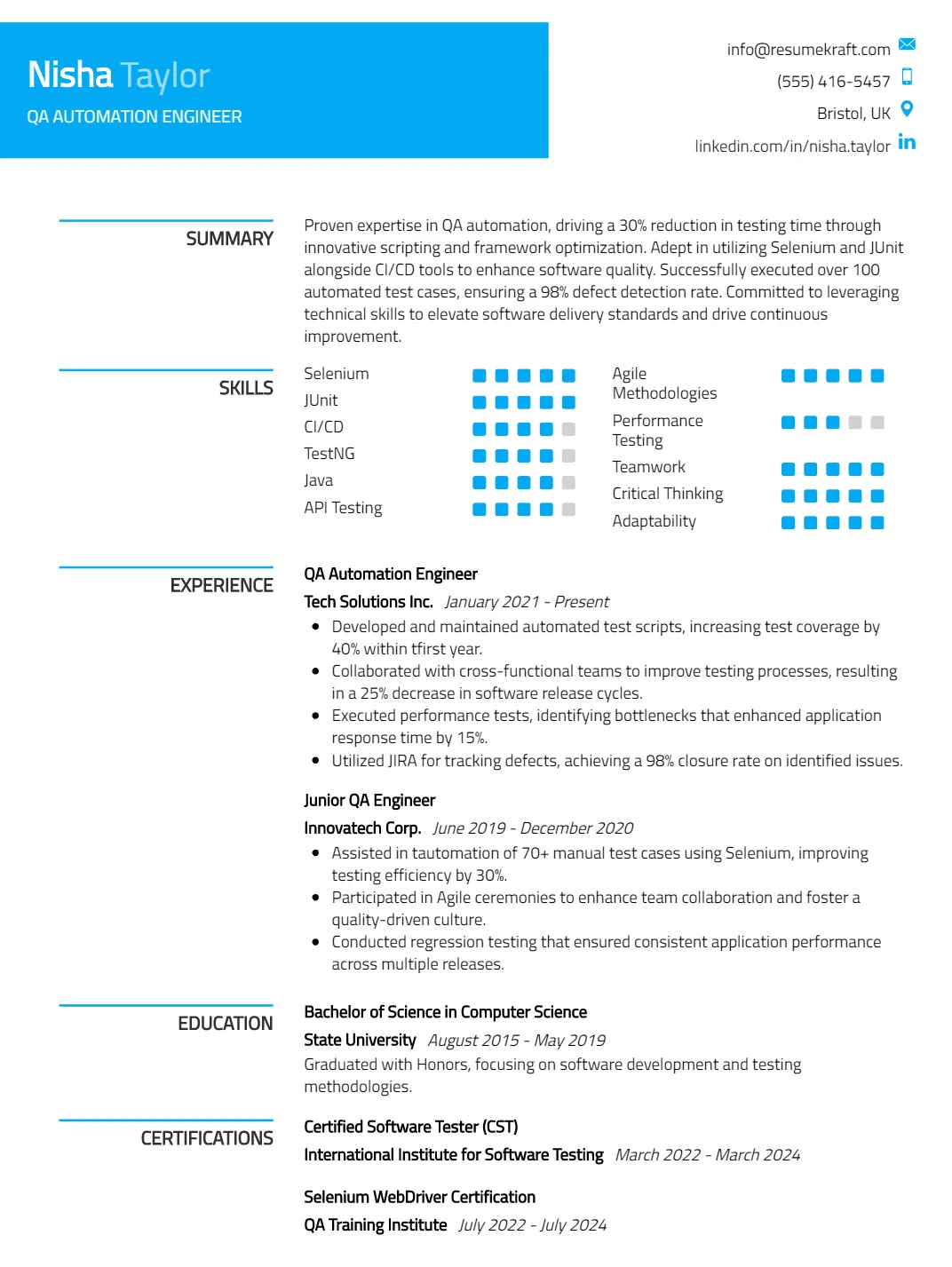
Why This Resume Works
This resume effectively showcases the candidate’s qualifications for a QA Automation Engineer position by highlighting relevant skills such as Selenium, JUnit, and CI/CD, which are crucial in automation testing. With approximately five years of experience in both QA Automation Engineer and Junior QA roles, it demonstrates a clear career progression. The structured format ensures easy readability and ATS compatibility, enhancing visibility to hiring software.
QA Specialist Lead Resume
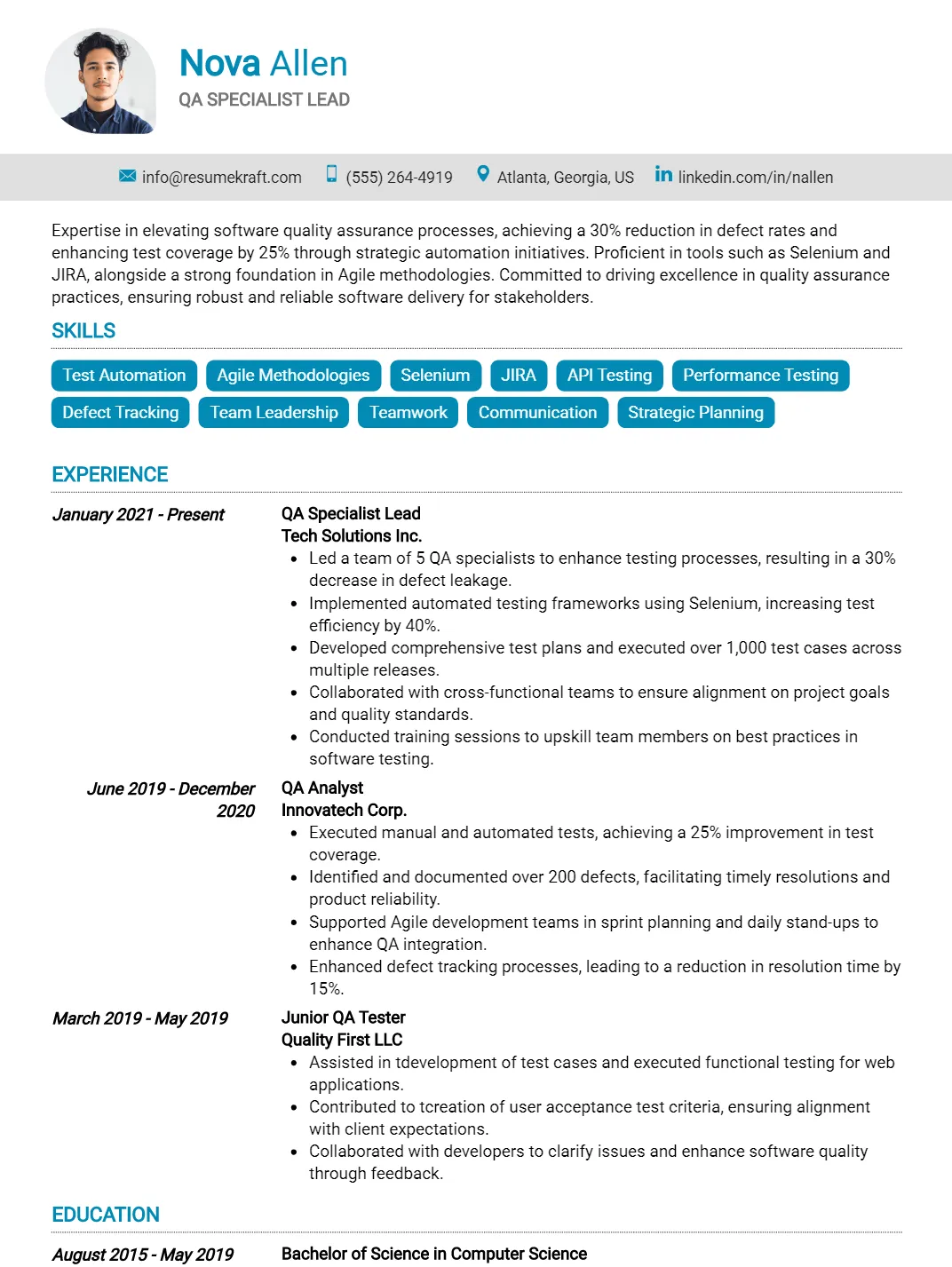
Why This Resume Works
This resume effectively highlights the candidate’s relevant skills and experience for a QA Specialist Lead position, showcasing expertise in test automation and Agile methodologies. The structured format clearly delineates their progression from Junior QA Tester to Lead, emphasizing leadership capabilities. By incorporating industry-specific keywords like Selenium and JIRA, the resume is optimized for ATS compatibility, ensuring it passes initial screenings. Additionally, strategic presentation of quantifiable achievements demonstrates the candidate’s impact in previous roles, making them an appealing choice for prospective employers.
Principal Software Testing Specialist Resume
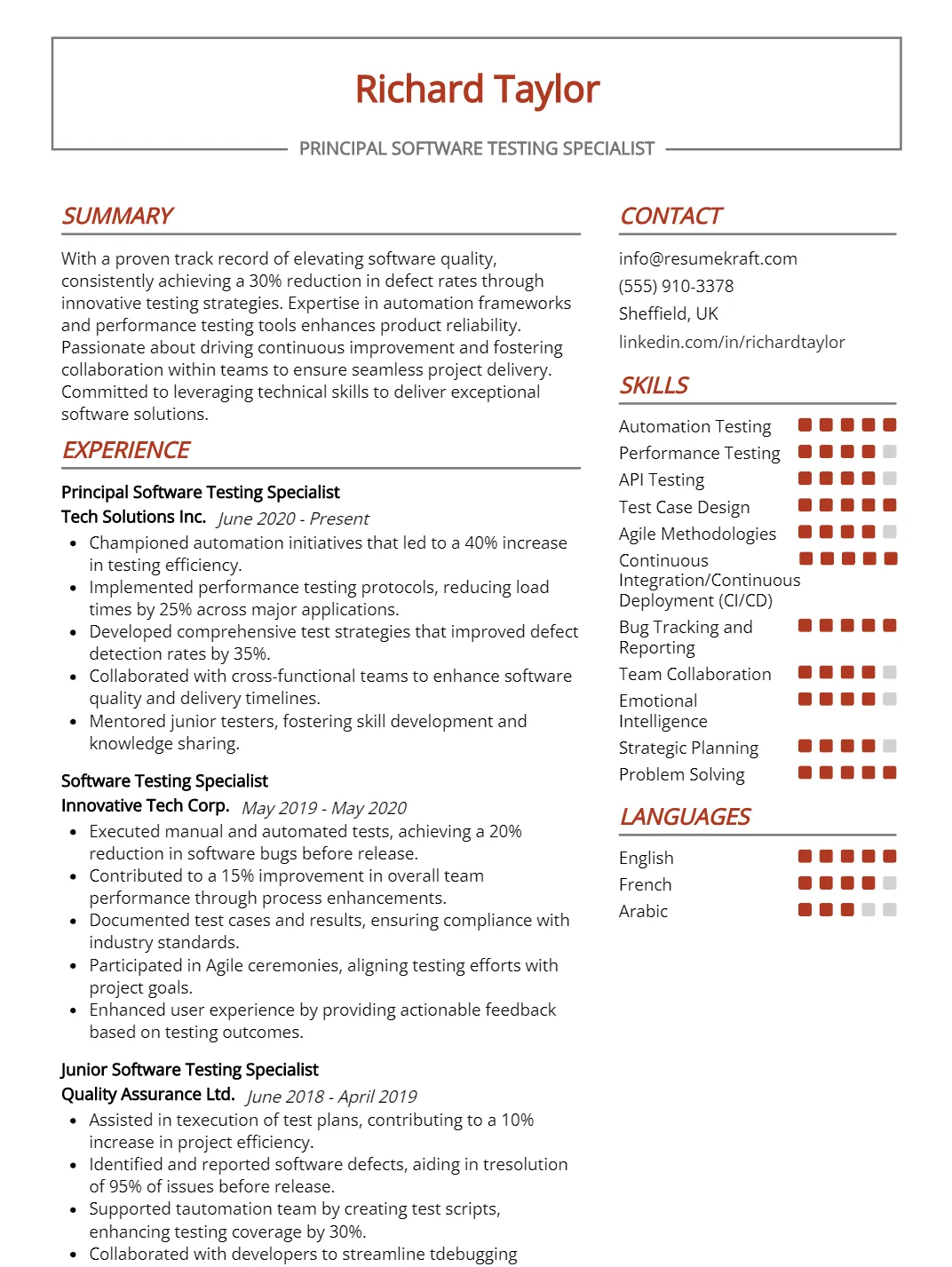
Why This Resume Works
This resume effectively highlights the candidate’s extensive experience and relevant skills for a Principal Software Testing Specialist position, showcasing expertise in automation, performance, and API testing. The structured format emphasizes key accomplishments aligned with industry standards, enhancing readability for hiring managers. Additionally, the use of targeted keywords ensures ATS compatibility, increasing visibility in applicant tracking systems. By strategically presenting achievements related to software quality and agile methodologies, this resume positions the candidate as a strong fit for leading testing initiatives within an organization.
Quality Assurance Technical Lead Resume
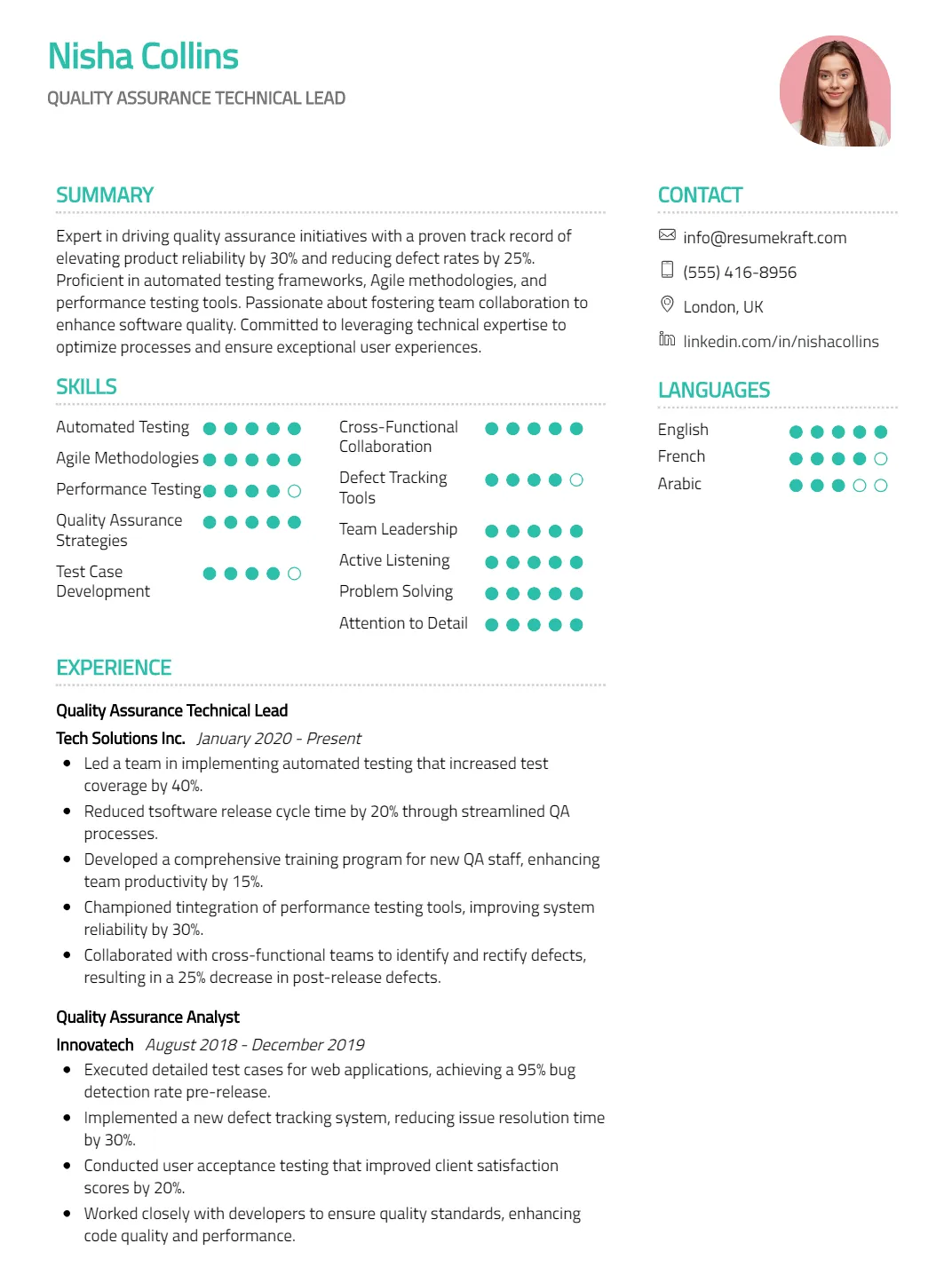
Why This Resume Works
This resume effectively targets the Quality Assurance Technical Lead position by showcasing relevant skills like Automated Testing and Agile Methodologies, essential for leading QA initiatives. With approximately 7 years of progressive experience in QA roles, it demonstrates a solid career trajectory. The clear format and structured layout enhance readability, catering to industry standards while ensuring ATS compatibility through keyword optimization. Additionally, strategic presentation of achievements highlights contributions to performance testing and quality assurance strategies, making the candidate’s qualifications compelling for potential employers.
Quality Assurance Manager Resume
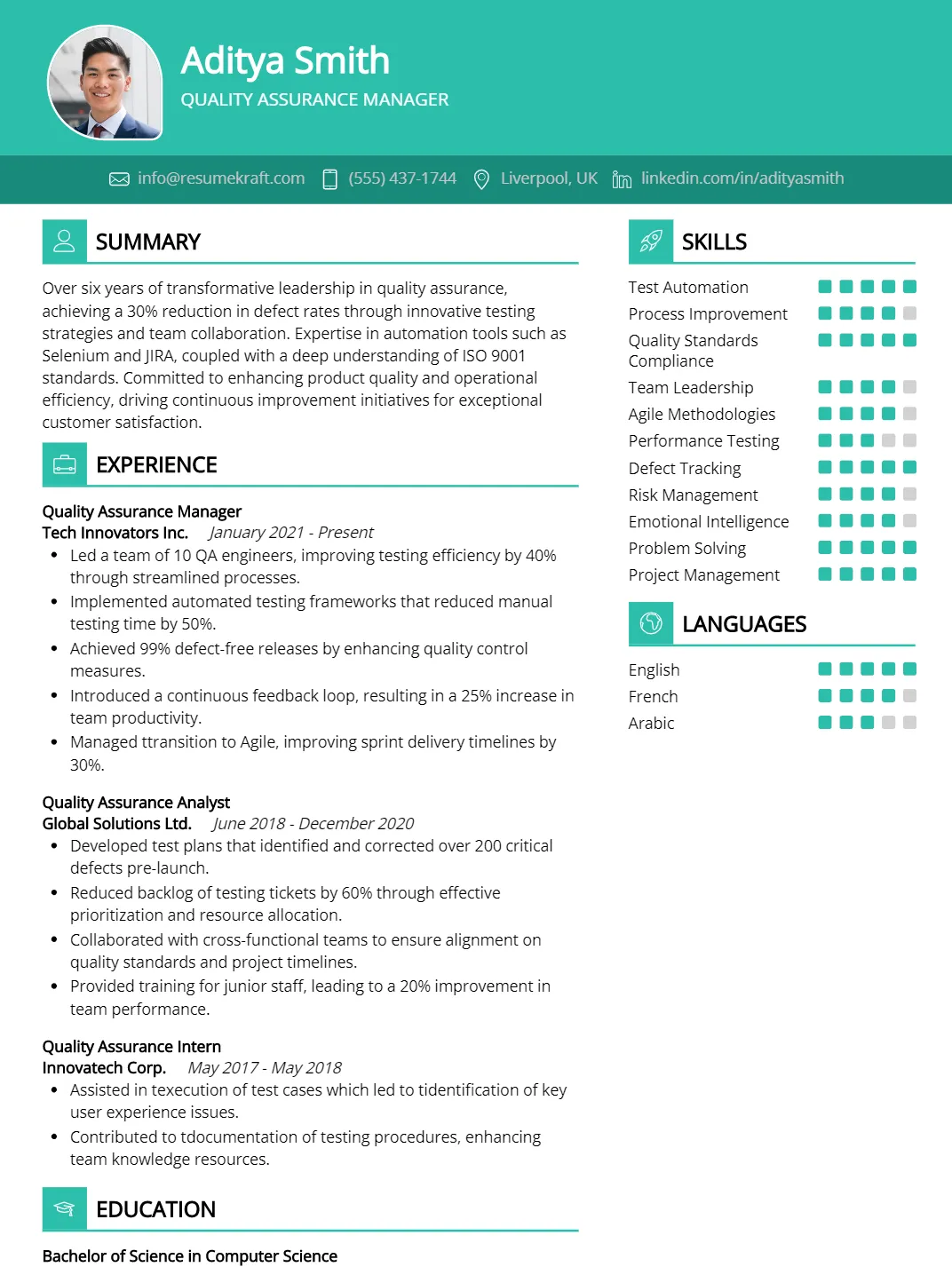
Why This Resume Works
This resume effectively highlights the candidate’s qualifications for a Quality Assurance Manager position through a targeted skill set, including test automation and process improvement. With seven years of progressive experience, it showcases relevant roles that demonstrate leadership in quality standards compliance. The clear format enhances readability, while strategically placed keywords ensure ATS compatibility, vital for the industry. Additionally, the emphasis on measurable achievements reinforces the candidate’s capability to drive results, making this resume compelling and aligned with industry expectations.
Quality Assurance Automation Specialist Resume
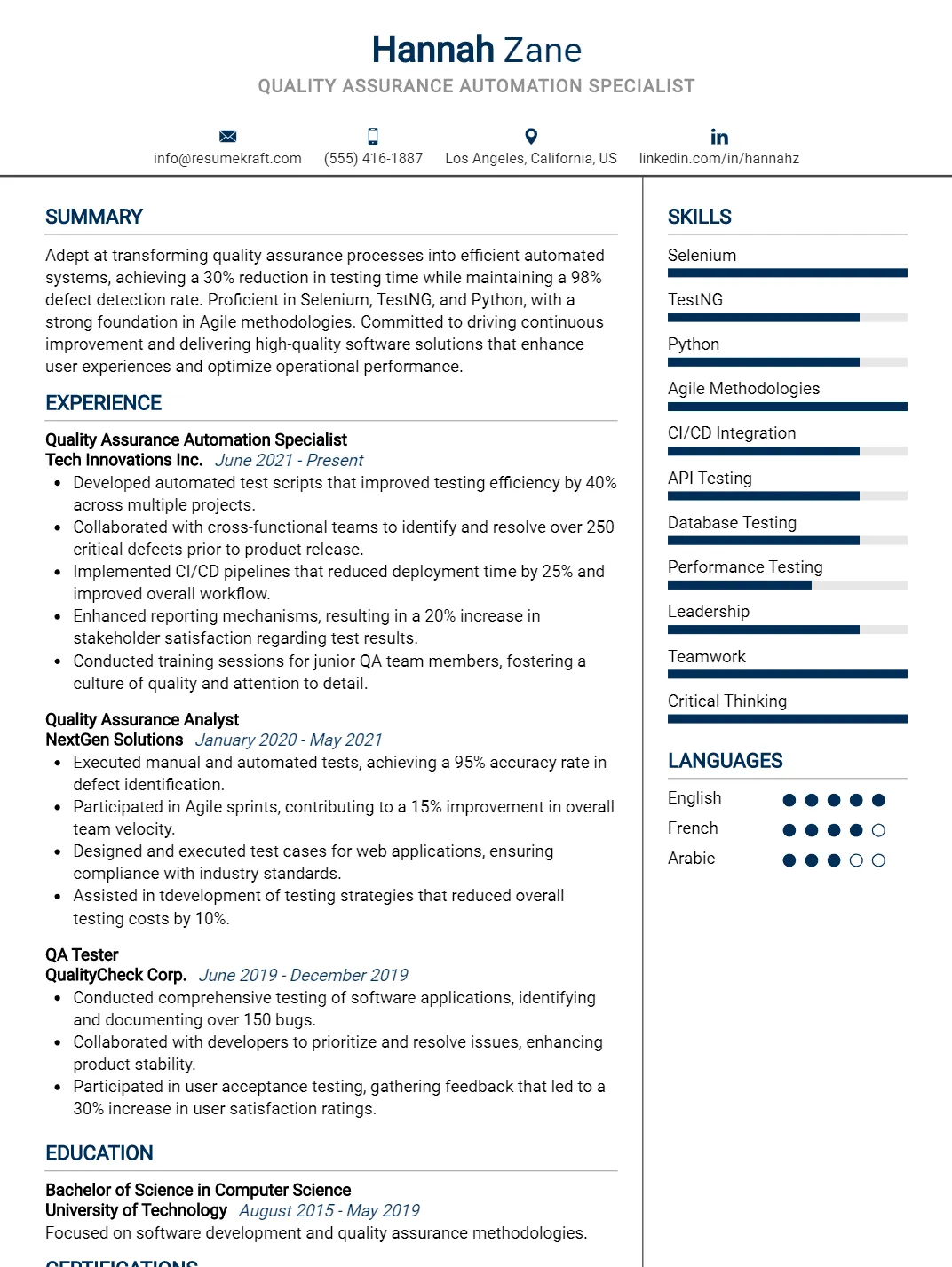
Why This Resume Works
This resume effectively showcases the candidate’s relevant skills, including Selenium and Python, essential for a Quality Assurance Automation Specialist. With five years of progressive experience in quality assurance roles, it highlights expertise in Agile methodologies and CI/CD integration, aligning with industry demands. The structured format enhances readability and emphasizes key achievements, making it easy for hiring managers to identify qualifications. Additionally, incorporating job-specific keywords ensures ATS compatibility, increasing the likelihood of passing initial screenings in a competitive field.
Mobile Application Tester Resume

Why This Resume Works
This resume effectively highlights the candidate’s relevant skills and experience for a Mobile Application Tester position, showcasing expertise in Mobile Application Testing, Automation Testing, Appium, and Selenium. With five years of progressive experience, it demonstrates a solid foundation in test case design. The structured format enhances readability while ensuring ATS compatibility through keyword optimization. Additionally, the strategic presentation of achievements emphasizes measurable successes in testing processes, making this resume stand out to potential employers in the mobile application industry.
Security Testing Specialist Resume
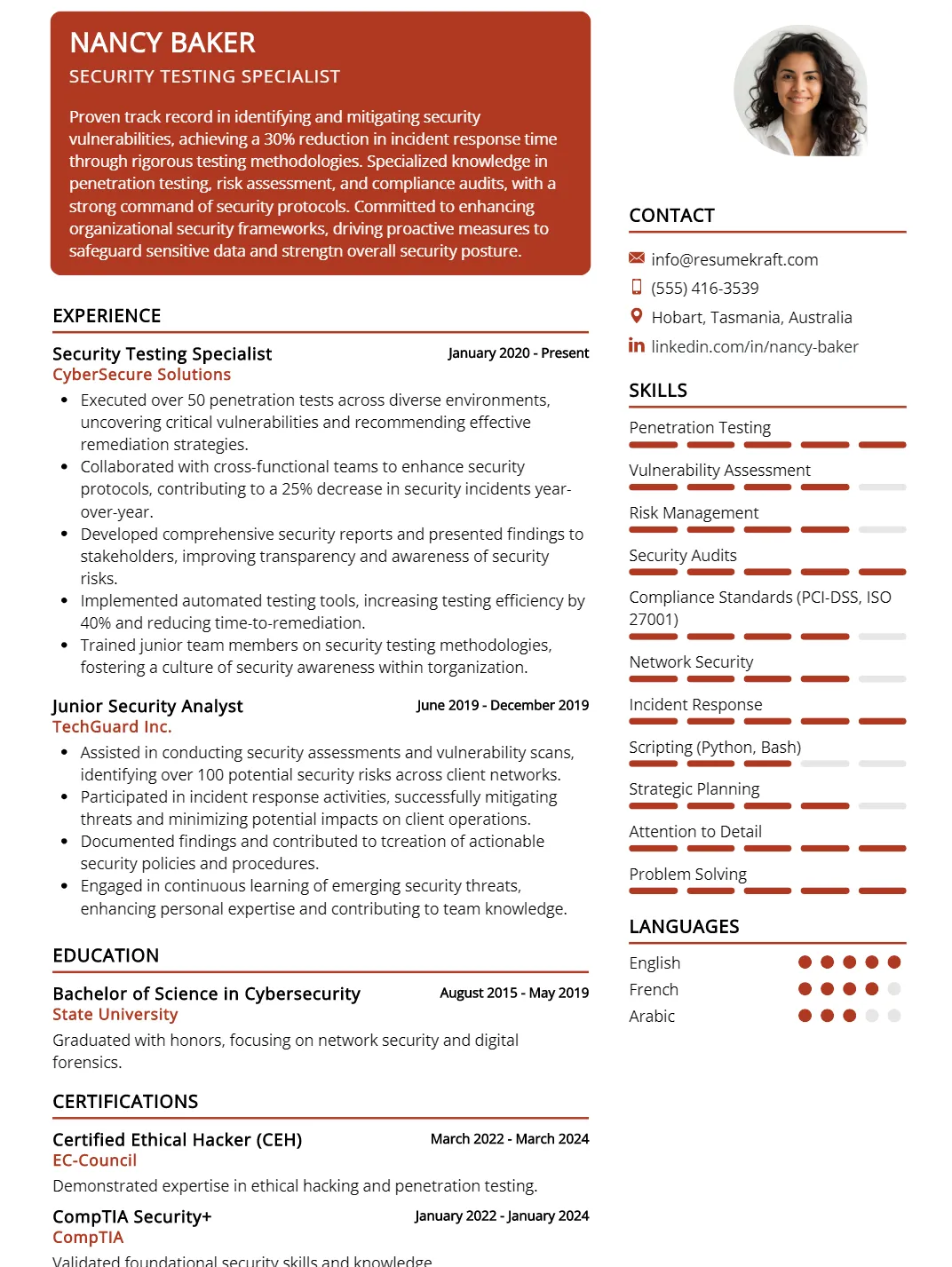
Why This Resume Works
This resume effectively showcases the candidate’s qualifications for a Security Testing Specialist position by highlighting key skills such as Penetration Testing and Vulnerability Assessment, directly relevant to the role. The structured format enhances readability, aligning with industry standards. Additionally, the inclusion of compliance knowledge (PCI-DSS, ISO 27001) demonstrates awareness of regulatory requirements. Its use of keywords ensures ATS compatibility, increasing visibility in applicant tracking systems. Strategic presentation of achievements emphasizes contributions to security audits and risk management, making it compelling for potential employers.
Performance Testing Engineer Resume
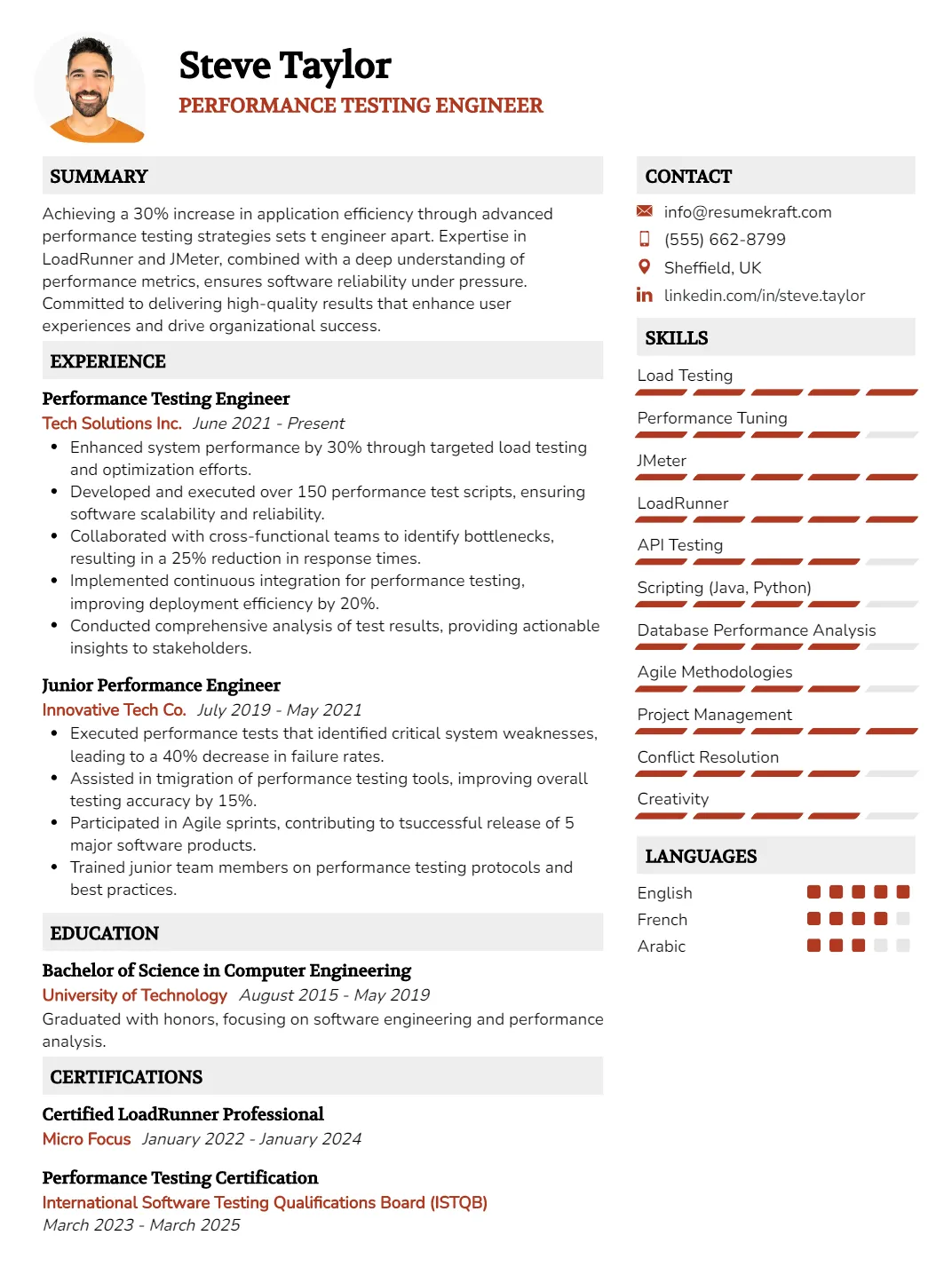
Why This Resume Works
This resume effectively showcases the candidate’s suitability for a Performance Testing Engineer position by highlighting relevant skills such as Load Testing, Performance Tuning, and proficiency in tools like JMeter and LoadRunner. With approximately six years of experience in performance testing roles, the structured format presents information clearly, enhancing readability. The use of industry-specific keywords ensures ATS compatibility, while strategically presented achievements demonstrate measurable impacts on system performance. Overall, this targeted approach positions the candidate favorably for prospective employers in this field.
Software Test Architect Resume
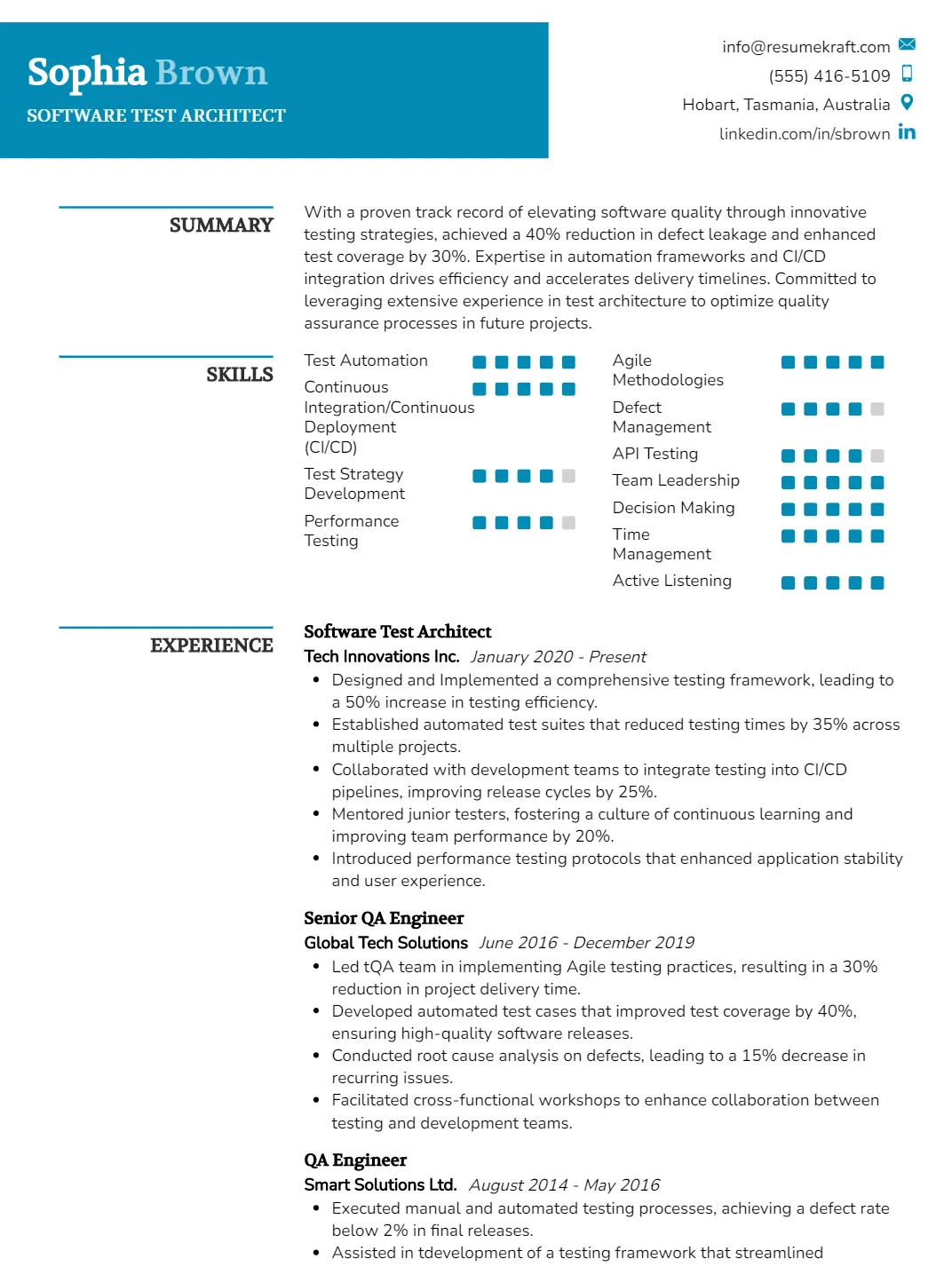
Why This Resume Works
This resume effectively positions the candidate for a Software Test Architect role by highlighting key skills such as Test Automation and CI/CD, essential for modern software development. With approximately 10 years of relevant experience, including roles as a Senior QA Engineer, it showcases a progressive career trajectory. The format is organized and easy to navigate, enhancing readability for hiring managers and ATS systems alike. Strategic achievements in performance testing and test strategy development further demonstrate the candidate’s impact, aligning perfectly with industry expectations.
How to format a Software Tester resume
Proper formatting is crucial for a Software Tester resume as it enhances readability and showcases your technical skills effectively. An organized resume format allows hiring managers to quickly identify your qualifications and experience, making a strong first impression.
- Use clear headings for sections like “Experience,” “Skills,” and “Education” to guide the reader through your background efficiently, ensuring they can easily locate key information relevant to the Software Tester role.
- Keep your font size between 10-12 points and choose professional fonts like Arial or Calibri. This ensures readability and maintains a clean, modern appearance that aligns with the tech industry standards.
- Utilize bullet points to describe your responsibilities and achievements succinctly. This format helps highlight your key contributions and technical skills, making it easier for employers to scan through your qualifications.
- Limit your resume to one page unless you have extensive experience. Focus on the most relevant details that align with the Software Tester position to keep the document concise and impactful.
- Incorporate white space effectively by using margins and line spacing. This prevents your resume from appearing cluttered and allows hiring managers to digest information more comfortably without feeling overwhelmed.
How to write your Software Tester resume experience
Effectively presenting work experience on a Software Tester resume is crucial as it showcases your technical skills, attention to detail, and problem-solving abilities. Employers are looking for candidates who can demonstrate their experience with various testing methodologies, tools, and technologies, as well as their ability to identify and resolve defects efficiently.
A well-structured experience section not only highlights your accomplishments but also reflects your understanding of the software development lifecycle. By quantifying achievements and using industry-specific terminology, you can create a compelling narrative that captures the interest of hiring managers and sets you apart from other candidates.
Worked on testing software and reported bugs. Helped the team improve software.
Executed over 200 test cases for a web application, identifying critical bugs that reduced post-release issues by 30%. Collaborated with developers using Agile methodologies to enhance product quality.
How to list your hard skills and soft skills on your resume
In the competitive field of software testing, showcasing both hard and soft skills on your resume is essential. Hard skills demonstrate your technical proficiency and knowledge of testing tools and methodologies, while soft skills highlight your ability to collaborate, communicate, and problem-solve within a team. A well-rounded resume that effectively balances these skills can significantly enhance your chances of landing an interview and showcasing your value to potential employers.
Hard Skills:
- Test Automation: Proficiency in using automation tools like Selenium or QTP to streamline testing processes.
- Manual Testing: Expertise in executing test cases manually to identify defects and ensure software quality.
- Performance Testing: Ability to assess software performance under various conditions using tools like JMeter.
- API Testing: Skilled in testing APIs using tools like Postman to ensure functionality and reliability.
- Database Testing: Knowledge of SQL for validating data integrity and performing backend testing.
- Bug Tracking: Familiarity with bug tracking tools like JIRA or Bugzilla to monitor and manage defects.
- Test Case Design: Experience in creating detailed test cases based on software requirements and specifications.
- Regression Testing: Ability to perform regression tests to confirm that new changes do not affect existing functionality.
- Agile Methodologies: Understanding of Agile principles to effectively participate in sprints and collaborative testing.
- Version Control: Proficient with Git for managing code versions and collaborating with developers.
- Mobile Testing: Experience in testing mobile applications on various devices and operating systems.
- Security Testing: Knowledge of security testing techniques to identify vulnerabilities in software applications.
- Continuous Integration: Familiarity with CI/CD practices to integrate testing into the development pipeline.
- Test Management Tools: Proficient in using tools like TestRail for organizing and managing testing efforts.
- Unit Testing: Ability to write and execute unit tests to ensure individual components function as intended.
Soft Skills:
- Attention to Detail: Strong focus on identifying subtle defects and ensuring software meets quality standards.
- Analytical Thinking: Ability to analyze requirements and design effective test strategies.
- Communication: Excellent verbal and written communication skills for articulating findings and collaborating with teams.
- Problem-Solving: Aptitude for identifying issues and developing effective solutions quickly.
- Teamwork: Capacity to work well in a team environment and build strong relationships with colleagues.
- Time Management: Skillful in managing multiple tasks and prioritizing workloads to meet deadlines.
- Adaptability: Flexibility to adjust to changing project requirements and learn new tools quickly.
- Critical Thinking: Capability to evaluate different testing approaches and make informed decisions.
- Empathy: Understanding user perspectives to enhance the testing process and improve user experience.
- Creativity: Innovative thinking to develop unique test scenarios and identify potential issues.
- Conflict Resolution: Ability to resolve disagreements effectively and foster a collaborative atmosphere.
- Self-Motivation: Proactive in taking initiative and ensuring tasks are completed efficiently.
- Organizational Skills: Strong organizational abilities to keep track of test cases and results methodically.
- Feedback Acceptance: Openness to constructive criticism and willingness to learn from others.
- Leadership: Capability to lead testing efforts and mentor junior testers as needed.
How to list your certifications and education on your resume
When presenting certifications and education on a Software Tester resume, it’s essential to highlight relevant qualifications that demonstrate your expertise in software testing methodologies, tools, and best practices. Certifications such as ISTQB (International Software Testing Qualifications Board) or CSTE (Certified Software Tester) add credibility. Additionally, a degree in Computer Science, Information Technology, or a related field can further showcase your foundational knowledge in software development and testing principles.
Ensure that your education and certifications are clearly listed in a dedicated section, including the institution’s name, the degree or certification obtained, and the date of completion. This organized approach makes it easy for hiring managers to assess your qualifications quickly.
Went to college for a few years. I have some certificates related to testing.
Bachelor of Science in Computer Science, XYZ University, 2022. ISTQB Certified Tester, 2023; CSTE Certification, 2023.
How to write your Software Tester resume summary or objective
A strong resume summary or objective is crucial for a Software Tester position as it provides a snapshot of your skills and career goals, helping to capture the attention of hiring managers. A summary is typically used by candidates with relevant experience to highlight their achievements and expertise, while an objective statement is suitable for those just starting their careers or transitioning fields, focusing on their career aspirations and what they hope to contribute.
Seeking a position in software testing where I can use my skills. I have some experience and want to improve my career.
Detail-oriented Software Tester with 3 years of experience in functional and regression testing, seeking to leverage expertise in automation tools to enhance software quality at XYZ Company.
Additional sections for a Software Tester resume
Including additional sections in a Software Tester resume can significantly enhance its effectiveness. These sections showcase relevant skills, achievements, and experiences that can set candidates apart in a competitive job market, demonstrating their suitability for the role.
- Certifications: Highlighting relevant certifications, such as ISTQB or CSTE, can validate your expertise in software testing methodologies, showcasing your commitment to professional development and industry standards.
- Projects: Detailing specific testing projects you have worked on provides concrete examples of your skills in action, illustrating your ability to handle real-world challenges and contribute to successful software releases.
- Technical Skills: A dedicated section for technical skills, such as programming languages and testing tools, makes it easy for employers to quickly assess your technical proficiency and compatibility with their tech stack.
- Professional Affiliations: Listing memberships in professional organizations related to software testing demonstrates your engagement with the industry and commitment to staying updated on best practices and emerging trends.
- Awards and Recognitions: Including any awards or recognitions received for your testing work can provide tangible evidence of your contributions, enhancing your credibility and showcasing your achievements within the field.
Key takeaways for writing a professional Software Tester resume
- Highlight your testing methodologies, such as Agile or Waterfall, to demonstrate your adaptability and understanding of various software development processes.
- Use specific metrics to quantify your achievements, like bugs detected or test cases automated, to showcase your impact on project quality.
- Consider using professional resume templates that cater to technical roles to ensure your layout is clean and appealing to hiring managers.
- Include relevant certifications, such as ISTQB or CSTE, to validate your expertise and commitment to the field of software testing.
- Utilize an ai resume builder to streamline the creation process, ensuring that your resume is optimized for applicant tracking systems and easy to read.
Frequently Asked Questions
How long should my Software Tester resume be?
Your Software Tester resume should ideally be one page, especially if you have less than 10 years of experience. This length allows you to concisely present your skills, relevant experience, and achievements without overwhelming the hiring manager. If you have extensive experience, a two-page resume can be acceptable, but ensure that every detail adds value and is relevant to the position you’re applying for.
What is the best format for a Software Tester resume?
The best format for a Software Tester resume is the reverse chronological format. This layout highlights your most recent work experience first, making it easy for hiring managers to see your latest accomplishments. Additionally, include sections for skills, certifications, and relevant projects. Use clear headings, bullet points, and an easy-to-read font to enhance readability and ensure that your key qualifications stand out effectively.
What should I highlight on my Software Tester resume to stand out?
To stand out, highlight your technical skills, such as familiarity with automation tools (e.g., Selenium, JUnit), programming languages (e.g., Java, Python), and testing methodologies (e.g., Agile, Waterfall). Also, showcase your problem-solving abilities, attention to detail, and experience with bug tracking tools. Including specific achievements, such as the reduction of defects or improvement in testing processes, can further demonstrate your impact and effectiveness as a Software Tester.
What are some ways to quantify my experience on my Software Tester resume?
Quantifying your experience can significantly enhance your resume’s impact. Use metrics to illustrate your achievements, such as the number of test cases executed, percentage of defects found before release, or improvements in testing efficiency. For instance, you might state that you increased test coverage by 30% or reduced testing time by 20%. Metrics provide tangible evidence of your contributions, making your accomplishments more compelling to potential employers.

